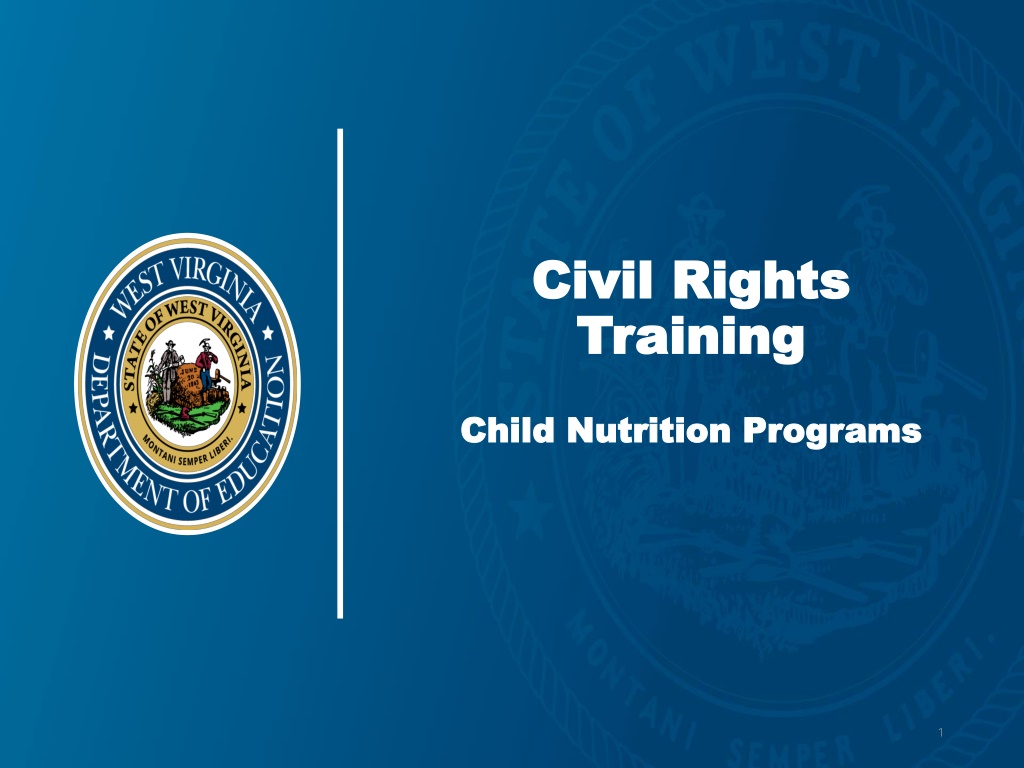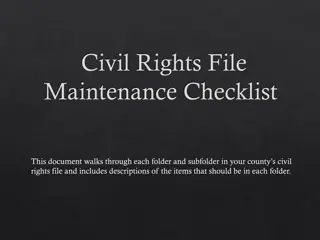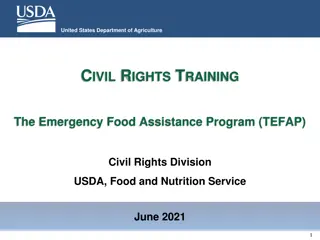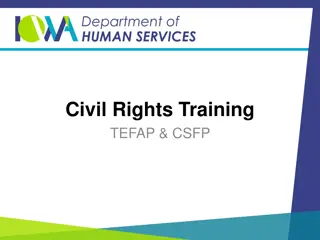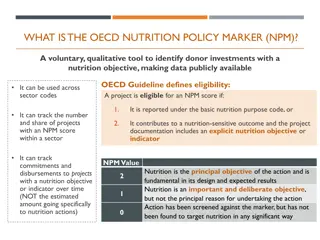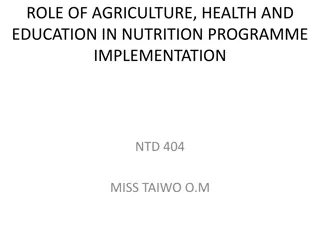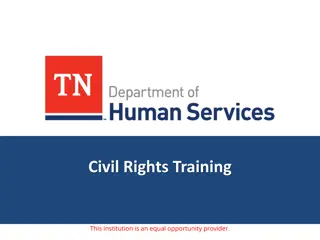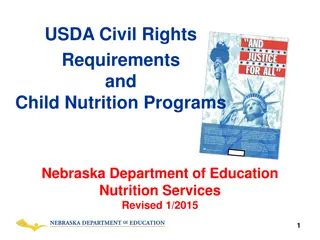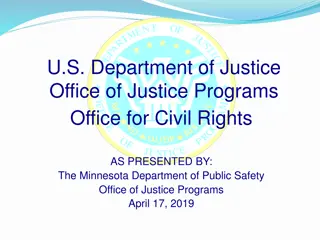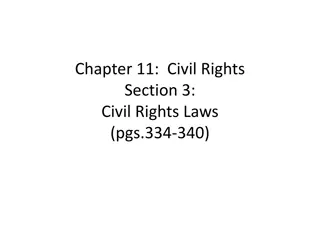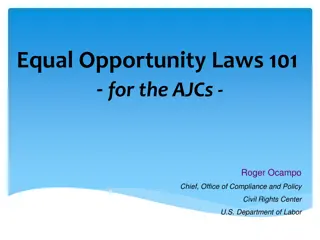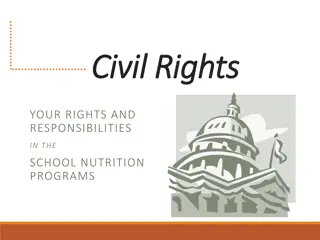Ensuring Compliance with Civil Rights in Child Nutrition Programs
The purpose of civil rights policy in USDA Food and Nutrition Service programs is to prevent discrimination in federally funded Child Nutrition Programs and safeguard program recipients. Discrimination, its forms, and protected classes are explained, along with areas of compliance such as assurances and training requirements.
Download Presentation

Please find below an Image/Link to download the presentation.
The content on the website is provided AS IS for your information and personal use only. It may not be sold, licensed, or shared on other websites without obtaining consent from the author. Download presentation by click this link. If you encounter any issues during the download, it is possible that the publisher has removed the file from their server.
E N D
Presentation Transcript
Civil Rights Civil Rights Training Training Child Nutrition Programs Child Nutrition Programs 1
Purpose of Civil Rights Policy Purpose of Civil Rights Policy The purpose of civil rights policy as it pertain to the United States Department of Agriculture (USDA) Food and Nutrition Service (FNS) programs is to ensure compliance with and enforcement of the prohibition against discrimination in ALL federally funded Child Nutrition Programs (CNP) and to protect the recipients and customers of said programs. 2
Civil Rights Concepts Civil Rights Concepts Stereotyping Preconceived beliefs or over-simplified generalizations about a particular group Prejudice A set of rigid and unfavorable attitudes toward a particular group that is formed without considering facts Discrimination The practice of treating people differently because of how we have grouped them in our minds according to our prejudices 3
What is discrimination in CNP? What is discrimination in CNP? Different treatment which makes a distinction of one person or a group of persons from others, either intentionally, by neglect, or by the actions or lack of actions based on a protected class Protected classes for CNP Race Color National origin Age Sex Disability 4
Areas of Compliance Areas of Compliance 1. Assurances 2. Public notification 3. Complaints of discrimination 4. Civil Rights training 5. Racial and ethnic data collection 6. Limited English Proficiency (LEP) 7. Disability compliance 8. Compliance reviews and resolution of noncompliance 5
Assurances Assurances To qualify for Federal financial assistance, an application must be accompanied by a written assurance that the entity to receive financial assistance will be operated in compliance with all nondiscrimination laws, regulations, instructions, policies, and guidelines. Example: Sponsoring Organization s Permanent Agreement with WVDE 6
Assurances Assurances Subrecipient agreements must also include a Civil Rights assurance of nondiscrimination. Example: Many SFAs contract with Food Service Management Companies (FSMC) to provide food service to students. SFAs are be responsible for ensuring that their FSMCs are in compliance with CR requirements. These assurances are binding on the program applicant and its successors, transferees, and assignees, as long as they receive assistance or retain possession of any assistance from USDA. 7
Public Notification Public Notification All FNS assistance programs (i.e. CNP) must include a public notification system. Elements of public notification Program availability Complaint information Nondiscrimination statement 8
Elements of Public Notification Elements of Public Notification Program Availability Inform applicants, participants, and potentially eligible persons of their program rights and responsibilities and the steps necessary for participation Complaint Information Must advise applicants and participants at the service delivery point of their right to file a complaint, how to file a complaint, and the complaint procedures Nondiscrimination Statement All information materials and sources, including websites, must contain a nondiscrimination statement. (The statement is not required to be included on every page of the program Web site. At a minimum the nondiscrimination statement or a link to it must be included on the home page of the program information.) 9
Methods of Public Notification Methods of Public Notification CNP Sponsoring Organizations must: Must prominently display the And Justice for All poster at service delivery points Inform applicants or participants of programs or changes in programs Provide information in alternative formats and languages as necessary Convey message of equal opportunity in all photographic or pictorial program information 10
Nondiscrimination Statement Nondiscrimination Statement In accordance with federal civil rights law and U.S. Department of Agriculture (USDA) civil rights regulations and policies, this institution is prohibited from discriminating on the basis of race, color, national origin, sex (including gender identity and sexual orientation), disability, age, or reprisal or retaliation for prior civil rights activity. Program information may be made available in languages other than English. Persons with disabilities who require alternative means of communication to obtain program information (e.g., Braille, large print, audiotape, American Sign Language), should contact the responsible state or local agency that administers the program or USDA s TARGET Center at (202) 720-2600 (voice and TTY) or contact USDA through the Federal Relay Service at (800) 877-8339. To file a program discrimination complaint, a Complainant should complete a Form AD-3027, USDA Program Discrimination Complaint Form which can be obtained online at: https://www.usda.gov/sites/default/files/documents/USDA-OASCR%20P- Complaint-Form-0508- 0002-508-11-28-17Fax2Mail.pdf, from any USDA office, by calling (866) 632-9992, or by writing a letter addressed to USDA. The letter must contain the complainant s name, address, telephone number, and a written description of the alleged discriminatory action in sufficient detail to inform the Assistant Secretary for Civil Rights (ASCR) about the nature and date of an alleged civil rights violation. The completed AD-3027 form or letter must be submitted to USDA by: mail: U.S. Department of Agriculture Office of the Assistant Secretary for Civil Rights 1400 Independence Avenue, SW Washington, D.C. 20250-9410; or fax: (833) 256-1665 or (202) 690-7442; or email: program.intake@usda.gov This institution is an equal opportunity provider. 11
Nondiscrimination Statement Nondiscrimination Statement (Spanish) De acuerdo con la ley federal de derechos civiles y las normas y pol ticas de derechos civiles del Departamento de Agricultura de EE. UU. (USDA), esta instituci n tiene prohibido discriminar por motivos de raza, color, origen nacional, sexo (incluida la identidad de g nero y la orientaci n sexual), discapacidad, edad, o represalia o represalia por actividad anterior de derechos civiles. (Spanish) La informaci n del programa puede estar disponible en otros idiomas adem s del ingl s. Las personas con discapacidades que requieran medios alternativos de comunicaci n para obtener informaci n del programa (p. ej., Braille, letra grande, cinta de audio, lenguaje de se as estadounidense), deben comunicarse con la agencia estatal o local responsable que administra el programa o el Centro TARGET del USDA al (202) 720- 2600 (voz y TTY) o comun quese con USDA a trav s del Servicio Federal de Retransmisi n al (800) 877-8339. Para presentar una queja por discriminaci n en el programa, el Demandante debe completar el Formulario AD-3027, Formulario de queja por discriminaci n en el programa del USDA, que se puede obtener en l nea en: https://www.usda.gov/sites/default/files/documents/USDA-OASCR %20P-Complaint-Form-0508-0002-508-11-28-17Fax2Mail.pdf, desde cualquier oficina del USDA, llamando al (866) 632-9992, o escribiendo una carta dirigida al USDA. La carta debe contener el nombre, la direcci n, el n mero de tel fono y una descripci n escrita de la supuesta acci n discriminatoria del denunciante con suficiente detalle para informar al Subsecretario de Derechos Civiles (ASCR) sobre la naturaleza y la fecha de la supuesta violaci n de los derechos civiles. El formulario o carta AD-3027 completo debe enviarse al USDA antes de: correo: Departamento de Agricultura de EE. UU. Oficina del Subsecretario de Derechos Civiles 1400 Avenida Independencia, SW Washington, DC 20250-9410; o fax: (833) 256-1665 o (202) 690-7442; o correo electr nico: program.intake@usda.gov Esta instituci n es un proveedor que ofrece igualdad de oportunidades. 12
Nondiscrimination Statement Nondiscrimination Statement USDA Nondiscrimination Statement (NDS) Short versions This institution is an equal opportunity provider. Esta instituci n es un proveedor que ofrece igualdad de oportunidades. (Spanish) **Can be used in special circumstances only and only with WVDE OCN approval** Translations Other languages are available here: Nondiscrimination Statement | USDA-FNS 13
Nondiscrimination Statement Nondiscrimination Statement At a minimum, the Nondiscrimination Statement must be on Application Form(s) Notification of Eligibility or Ineligibility Notice of Adverse Action Form Program (Home) Web Page Public Information, including program literature 14
And Justice For All Poster And Justice For All Poster All sites must display posters in a prominent location for all to view Poster reflects current Nondiscrimination Statement and new graphic 15
Complaints of Discrimination Complaints of Discrimination Applicants or participants allege different treatment based on protected class(es) Race Color National origin Age Sex (gender identity and sexual orientation) Disability 16
Complaints of Discrimination Complaints of Discrimination Applicants and participants must file within 180 days of the alleged action Confidentiality extremely important All complaints must be documented by the Sponsoring Organization on the Civil Rights Complaint Log Or, a participant may file their complaint directly with USDA using the following forms: Filing a Program Discrimination Complaint as a USDA Customer | USDA 17
Civil Rights Complaint Log Civil Rights Complaint Log 18
Complaints of Discrimination Complaints of Discrimination Once a complaint is received by the Sponsoring Organization, the complaint must be documented on the Civil Rights Complaint Log then the WVDE OCN must be notified immediately. The WVDE OCN will then forward all complaints to USDA within five days of receipt of complaint. 19
Civil Rights Training Civil Rights Training Training is required so that individuals involved in all levels of administration of programs that receive Federal financial assistance understand Federal laws, regulations, instructions, policies and other guidance. 20
Civil Rights Training Civil Rights Training State agencies are responsible for training local agencies/subrecipients. Local agencies are responsible for training their staff and subrecipients on an annual basis. Includes frontline staff and those who supervise frontline staff New employees must receive Civil Rights training before participating in Program activities. Volunteers (if any) must also receive training appropriate for their roles and responsibilities. 21
Civil Rights Training Civil Rights Training All staff should receive training on all aspects of Civil Rights compliance, including: Assurances Public notification Complaints of discrimination Civil Rights training Racial and ethnic data collection Limited English Proficiency (LEP) Disability compliance Compliance reviews and resolution of noncompliance Conflict Resolution Customer Service 22
Customer Service Customer Service Service is Effectively communicating with customers, Responding to their needs, Valuing their worth, and Instilling excellence through Courtesy, confidence, and Enthusiasm. 23
Conflict Resolution Conflict Resolution IDENTIFY THE PROBLEM. Identify the problem based on the information the customer gives you. DETERMINE A SOLUTION. Depending on the specifics of the conversation and your knowledge of your organization, the solution may involve calling the customer again. GAIN APPROVAL FROM THE CUSTOMER. If the customer does not agree to the proposed solution, it will resolve nothing! MAKE AN AGREEMENT. You and the customer should determine what is to be done, when it is to be done, and by whom. If it is not possible, suggest an alternative. FOLLOW UP. Personally make sure that the customer has been satisfied; and provide feedback. 24
Racial and Ethnic Data Racial and Ethnic Data Collection and Reporting Collection and Reporting Data collection is mandatory Recipients of federal financial assistance must maintain a system to collect racial and ethnic data in accordance with FNS policy Data must be maintained for 3 years Must be submitted to FNS as requested 25
Racial and Ethnic Data Racial and Ethnic Data Collection and Reporting Collection and Reporting Data must be collected using a two-part question 1. Ethnicity Hispanic or Latino Not Hispanic or Latino 2. Race (may select more than one) American Indian or Alaskan Native Asian Black or African American Native Hawaiian or Other Pacific Islander White 26
Racial and Ethnic Data Racial and Ethnic Data Collection and Reporting Collection and Reporting If disparities or incidents of underrepresentation exist, it will be necessary to investigate the causes. If necessary, take action to ensure equal opportunity to participate in the program(s). 27
Limited English Proficiency (LEP) Limited English Proficiency (LEP) and Program Access and Program Access Who are persons with LEP? Individuals who do not speak English as their primary language and who have a limited ability to read, speak, write, or understand English because of their national origin Recipients of Federal financial assistance have a responsibility to take reasonable steps to ensure meaningful access to their programs and activities by persons with LEP. Failure to provide meaningful access to persons with LEP could be discrimination on the basis of national origin. 28
Limited English Proficiency (LEP) Limited English Proficiency (LEP) and Program Access and Program Access Factors included in assuring meaningful access include: The number or proportion of LEP people eligible to be served or likely to be encountered by the program The frequency with which LEP individuals come in contact with the program The nature and importance of the program, activity, or service provided by the program to people s lives The resources available to the recipient and costs 29
Limited English Proficiency (LEP) Limited English Proficiency (LEP) and Program Access and Program Access Translation of vital documents is required. Oral translations and interpretation services are also required if such a request arises. Staff training regarding how to provide LEP populations with meaningful access is paramount (frontline staff). 30
Limited English Proficiency (LEP) Limited English Proficiency (LEP) and Program Access and Program Access Language services Applicants and participants cannot be asked to bring their own interpreters Children should not be used as interpreters Examples of language services Bilingual staff Telephone interpreter lines Oral interpretation services Written language services Community organizations and volunteers 31
Limited English Proficiency (LEP) Limited English Proficiency (LEP) and Program Access and Program Access Population data sources: US Census Data http://www.census.gov/2010census/data/ American Community Survey http://www.census.gov/acs/ Migration Policy Institute s National Center on Immigrant Integration Policy http://www.migrationpolicy.org/ 32
Disability Discrimination Disability Discrimination What is the definition of disability? A person who has a physical or mental impairment which substantially limits one or more major life activities, has a record of such an impairment, or is regarded as having such an impairment. Major life activity means functions such as caring for one s self, performing manual tasks, walking, seeing, hearing, speaking, breathing, learning and working. functions of the immune system, normal cell growth, digestive, bowel, bladder, neurological, brain, respiratory, circulatory, cardiovascular, endocrine, and reproductive functions. (ADA Amendments Act of 2008) 33
Disability Discrimination Disability Discrimination State and local offices must provide reasonable accommodations in policies and practices to applicants and participants with disabilities when necessary. Reasonable accommodations Must be funded through State/local offices, not by applicants and participants Require good communication between all parties involved Provide the same level of service to applicants and participants in an alternative way 34
Disability Discrimination Disability Discrimination Accessibility of State and local agency websites, and online application systems to persons with visual impairments and other disabilities. Physical Program access to persons in wheelchairs and with mobility disabilities. Accessibility through Braille, large print and audio tape and other alternative formats. Accessibility to American Sign Language (ASL) and interpreters. 35
Compliance Reviews Compliance Reviews Examine the activities of State agencies, local agencies, and subrecipients to determine Civil Rights compliance FNS Civil Rights and Program staff review State agencies. FNS staff and State agencies review local agencies and subrecipients. Significant findings must be provided in writing to the reviewed entity. 36
Compliance Reviews Compliance Reviews There are three types of compliance reviews Pre-award compliance reviews Routine (post-award) compliance reviews Special compliance reviews 37
Pre Pre- -Award Compliance Reviews Award Compliance Reviews Potential CNP Sponsoring Organizations must be in compliance with Civil Rights requirements prior to approval for Federal financial assistance. Reviews conducted during pre-approval review. Reports must be maintained in appropriate program files. 38
Routine/Post Routine/Post- -Award Compliance Award Compliance Reviews Reviews State agencies must conduct routine compliance reviews as identified by FNS Instruction 113-1 and program-specific regulations and policies Assess all of the Civil Rights compliance areas Sample post-award review questions Do printed materials contain the nondiscrimination statement? Is the And Justice For All poster displayed appropriately? Are program informational materials available to all? Is data on race and ethnicity collected appropriately? How are applicants and participants advised of their right to file a Civil Rights complaint of discrimination? Are reasonable accommodations appropriately made for people with disabilities? Are appropriate language services provided? 39
Special Compliance Reviews Special Compliance Reviews Conducted by USDA s Office of the Assistant Secretary for Civil Rights independently or in conjunction with FNS program or Civil Rights staff May be scheduled or unscheduled To follow-up on previous findings of noncompliance To investigate reports of noncompliance by other agencies, media, or grassroots organizations May be specific to an incident or policy History of statistical underrepresentation of particular group(s) Pattern of complaints of discrimination 40
Resolution of Noncompliance ce Resolution of Noncomplian A factual finding that any Civil Rights requirement, as provided by law, regulation, policy, instruction, or guidelines, is not being adhered to by a State agency, local agency or subrecipient agency Steps must be taken immediately to obtain voluntary compliance A finding s effective date is the date of notice to the reviewed entity 41
Contact Information Contact Information Samantha Reeves Coordinator West Virginia Department of Education Office of Child Nutrition Building 6, Room 750 1900 Kanawha Blvd, East Charleston, WV 25305 Telephone: (304) 558-3396 Email: snsnuffer@k12.wv.us 42
